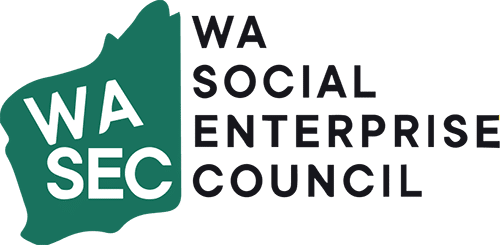What is social procurement?
Social procurement is when organisations use their buying power to generate social value above and beyond the value of the goods, services or works being procured.
The WA Government is a significant purchaser of goods, services and works each year. In 2023-24 it awarded over 4,500 contracts with an estimated contract value of over $10 billion.
This presents a significant opportunity for the WA government to leverage its buying power to create benefits to the wider community, such as by engaging enterprises that are focused on positive social and environmental outcomes.
What’s happening in WA?
The Aboriginal Procurement Policy (APP) was implemented in 2018 to support Aboriginal economic development by increasing government contracting with Aboriginal businesses and, since 2023, Aboriginal Community Controlled Organisations (ACCOs).
The APP sets mandated progressive targets applying to WA Government agencies for the award of contracts to Aboriginal suppliers. A second iteration of the Policy was released in 2021 to include increased targets and broader participation requirements for contractors to certain contracts.
The policy has been successful, with 368 contracts worth over $440m being awarded in 2023-4. This represented 5.8 per cent of government contracts awarded to Aboriginal suppliers, well above the 2023-24 target of 4 per cent set out by the policy. But, many agencies struggle to meet their targets. There are many reasons for this, including a narrow pool of suppliers and low awareness of Aboriginal businesses beyond traditional sectors.
Under the Policy contracts are not counted if they are under $50,000 or awarded to Aboriginal businesses that are not registered on either Supply Nation’s Indigenous Business Direct or the Aboriginal Business Directory WA. For example, Aboriginal Community Controlled Organisations (ACCOs) are not required to be on these registers.
This means that some efforts made by the WA government to engage with the Aboriginal business sector are not fully recognised in the figures above.
WA Social Procurement Framework (2021) was introduced to enhance social, economic, and environmental benefits through government procurement. It acts as a guide for what government agencies can do when going through the procurement process to support community development, sustainable practices, and economic inclusion outcomes.
What can we learn from this?
The framework has many positives, including promoting innovation, incorporating environmental goals, and encouraging opportunities for people with disabilities, small and medium sized businesses, and minority-owned businesses. However, because it is a guide rather than a mandatory policy, it is non-enforceable and there is no incentive to comply with the framework, leading to inconsistent application across agencies. It’s also tough to implement, with many agencies struggling to meet targets due to limited supplier availability and capacity mismatches. On top of that, without outcomes measurement built into the framework, it’s difficult to assess the framework’s true impact.
What can we learn from other jusidications?
Victoria, Australia
The Victorian Government launched Australia’s first Social Enterprise Strategy in 2017. The strategy aimed to grow the social enterprise sector, strengthen its connectivity, and unlock its potential to create jobs and deliver positive social impact. It focuses on building business skills and capability, fostering a connected and innovative social enterprise ecosystem across Victoria, and opens doors for social enterprises to work with Government on projects. It provides social enterprises with access to innovative financing solutions, to help them scale impact and boost their profile, elevating the voices of social enterprises across Victoria. Finally, the strategy includes a rigorous social enterprise certification scheme that improves social enterprises’ access to markets, facilitates networking between buyers and suppliers and enhances the sector’s credibility.
In the 2019/20 financial year, $14.1M was spent with 79 certified social enterprises by Victorian Government departments and agencies. An additional $36.9M was directly spent with 90 verified Aboriginal businesses and $9.3M with 37 Aboriginal organisations in the same financial year. Victoria’s Social Enterprise Strategy has been hugely successful in growing their social enterprise sector.
United Kingdom

The Public Services (Social Value Act) came into effect in 2013, requiring public authorities to consider how the services they procure might improve the economic, social, and environmental wellbeing of their areas. The Act mandates the consideration of social value, promoting the inclusion of social enterprises and the voluntary sector in delivering public services.
The UK also has a Social Enterprise Boost Fund, delivered in specific local areas to support the growth and sustainability of social enterprises. Launched in 2023, the fund aims to strengthen social enterprises and enable them to better participate in procurement opportunities. The Social Enterprise Boost Fund replaced the Social Investment Tax Relief (SITR) scheme that ended in April 2023.
SITR helped bridge funding gaps for social enterprises excluded from traditional schemes like the Enterprise Investment Scheme (EIS), but it had low awareness, restricted eligibility and a complex application process, resulting in low take-up due to accessibility gaps.
Canada

The Procurement Strategy for Aboriginal Businesses (PSAB) was launched in 1996 by the Government of Canada to increase the participation of Indigenous businesses in federal procurement. Its key purpose is to enhance the creation, growth and long-term viability of Indigenous businesses by assisting them in competing for and winning federal procurement opportunities.
The Strategy requires that the government sets aside a certain amount of contracts exclusively for competition among qualified Indigenous businesses. Since its inception, the Canadian government has awarded more than $1 billion in contracts to Indigenous businesses.
In addition, Community Benefit Agreements are implemented at various government levels, and ensure that specific social benefits are delivered alongside infrastructure and development products. The City of Vancouver mandates a Community Benefits agreement policy for developments exceeding 45,000 sqm. Community Benefits Agreements embed social value requirements into procurement contracts, aligning with social procurement objectives and mandate local hiring, apprenticeships and community investments, and include monitoring and reporting mechanisms to ensure compliance and measure impact.
Finally, the Social Finance Fund is a federal initiative launched in 2019, aimed at providing affordable, flexible capital for social purpose organisations, including social enterprises. This financing accelerates the growth of social finance markets, and enhances the capacity of social purpose organisations, so they can deliver innovative solutions to social challenges. The fund will provision up to $755 million over 10 years to support social finance initiatives.
What would WASEC like to see?

- Strengthened procurement opportunities to motivate and reward better buying
The WA Government can strengthen procurement opportunities by mandating the inclusion of jobs-focused enterprises in government procurement strategies, and setting procurement quotas. By requiring that government departments set aside a certain amount of their budget to be spent with social enterprises, governments can buy more than just roads, buildings or equipment, they can buy social impact. By taking inspiration from Canada’s Procurement Strategy for Aboriginal Businesses and the UK’s Public Services (Social Value Act), the WA government can prioritise engagement with social enterprises across government contracts.
The WA Government can also develop subcontracting pathways and enterprise hubs, to support collaboration between social enterprises and fairer participation for smaller enterprises.
- Investment in capability building to help the sector to scale
One of the major reasons social enterprises are not engaged in more government work in WA is that many social enterprises do not have access to the capital needed to deliver large contracts, or a social enterprise does not have the capacity to provide the goods or services required by the government.
But, by ensuring low-barrier access to capital through government-backed loans and grants, as well as collaborating with WASEC to provide business support, training programs and sustained funding, the WA government can diversify the types of social enterprises in this state, whilst scaling the capacity of existing enterprises.
- More transparency around contracts, so social start-ups can compete
WA’s current framework doesn’t record any contracts under $50,000 completed by social enterprises, so there’s no way of knowing how many small enterprises and start-ups the government is contracting.
Real-time tracking and public reporting of government spending on jobs-focused enterprises keeps the government accountable- and ensures the impact of social procurement is measurable, allowing the government to track the expansion over time.
- Investment in jobs-focused social enterprises which will create and keep jobs in the regions
About 20 percent of WA’s population live outside of major towns and cities. Across regional WA, the labour force participation rate sits at 59.4%, compared to 65.2% in the Greater Perth area.
The WA government should focus on social enterprise in regional, rural and remote areas, by developing policies and financial incentives to support jobs-focused enterprises outside of the Greater Perth area, as well as collaborating with WASEC to establish regional enterprise hubs, enabling businesses to support each other and network.
5. Prioritise outcome-based contracts for social enterprises
Shifting to payment-by-outcomes models can better recognise the true value social enterprises deliver. While there’s a common myth that socially responsible goods and services always cost more, many social enterprises remain competitive with private sector pricing – often absorbing the cost of delivering social impact rather than passing it on to buyers. By valuing contracts based on positive social and environmental outcomes, rather than just cost, governments and businesses can support sustainable impact while ensuring high-value services. Targeted subsidies can also help bridge the gap, enabling social enterprises to scale their impact and create long-term change.
- Building credibility in the sector through verification
Victoria’s enterprise certification scheme improves social enterprises’ access to markets, facilitates networking between buyers and suppliers and enhances the sector’s credibility. This certification scheme makes tracking the impact of social enterprises easier, and led to $14.1M spent with 79 certified social enterprises by Victorian Government departments and agencies in the 2019/20 financial year.
The WA Government can work with WASEC to introduce a similar, standardised verification process in WA for jobs-focused enterprises, and fund WASEC to grow and maintain WA’s only social enterprise directory.

